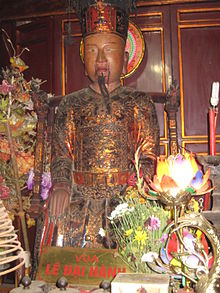Lê Đại Hành
| Lê Hoàn 黎桓 |
|
|---|---|
| Emperor of Đại Cồ Việt | |

A statue of emperor Lê Hoàn in ancient capital Trường An.
|
|
| Reign | 980 - 1005 |
| Predecessor | Đinh Phế Đế |
| Successor | Lê Long Việt |
| Born |
10 August 941 Ha Nam, |
| Died | 1005 Trường An, |
| Burial | Mã Yên mountain, Trường An |
| Spouse |
Lê Thị Ngọc Vân Lê Thị Ngọc Mai Lê Thị Ngọc Khánh Lê Thị Ngọc Hoan Lê Thị Ngọc Thụy |
| Issue |
Phất Ngân, Long Tuệ Long Thâu, Long Tích Long Việt, Long Đinh Long Đĩnh, Long Cân Long Tung, Long Tương Long Kính, Long Mang Long Đề, Long Tuấn Long Liễn, Long Hiệu |
| House | Early Lê Dynasty |
| Father | Lê Mịch |
| Mother | Đặng Thị Sen |
Lê Hoàn (Chinese: 黎桓, 941 - 1005), posthumous name Emperor Đại Hành (大行皇帝), was the first emperor of the Early Lê dynasty, succeeding Đinh dynasty as rulers of Annam.
He started his career as a commander in the army of the first Vietnamese emperor Đinh Bộ Lĩnh and rose to the position of commander-in-chief. Following the death of Đinh Bộ Lĩnh, Lê Hoàn became regent to Đinh Bộ Lĩnh's successor, the six-year-old Đinh Toan. Lê Hoàn deposed the boy, married his mother the Empress Dowager Duong Van Nga, and in 980 proclaimed himself emperor. He retained the imperial capital at Hoa Lư and succeeded in warding off several invasions by the Chinese Song Dynasty, but paid them regular tribute with the aim of securing peaceful relations. When he died in 1005, the Lê Dynasty went into decline.
Lê Hoàn (Sau La Vua LêĐạiHành) was born in 941 into a poor family in Bao Thai (Ha Nam). At that time, the area belonged to the kingdom ruled by Ngô Quyền, the Vietnamese general who had liberated the country from Chinese occupation in 938. Lê Hoàn was orphaned while still very young, but had the good fortune of being adopted by a local official who belonged to the Lê family. As Lê Hoàn matured under the official's tutelage, he proved himself to be both talented and studious. Mundane assessments of his potential were confirmed by auspicious omens. According to legend, one night his adoptive father went to check up on him after Lê Hoàn had gone to bed; he found the boy fast asleep watched by a golden dragon who hovered protectively above him. Following the death of Ngô Quyền in 944, the country gradually dissolved into chaos For a time, Ngô Quyền's two eldest sons jointly wielded the royal power, but they were not consistently successful in subduing rebellious elements. After they died in 954 and 965 respectively, the country was fractured into the domains of 12 independent warlords. In these chaotic times, Lê Hoàn matured to manhood. Together with other young men, he practiced the martial arts and dreamt of saving the nation. After years of conflict, the task of reunifying the country under one rule was accomplished by Đinh Bộ Lĩnh, a warlord from Hoa Lư in Ninh Bình Province, who succeeded by means of an adept mixed strategy of warfare and diplomacy. In 968, Bộ Lĩnh declared himself Emperor of Dai Co Viet, establishing his capital at Hoa Lư. Lê Hoàn became a military general under ĐinhBộLĩnh's adult son ĐinhLiễn, and was promoted through the ranks until he became the commander-in-chief of ĐinhBộLĩnh's armed forces.
...
Wikipedia
